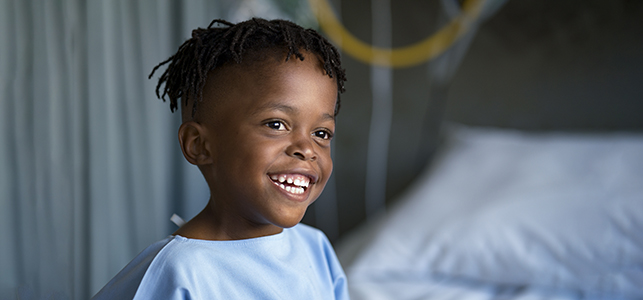
When kids are facing surgery, parents often – and understandably – have questions about anesthesia. Most parents find it reassuring that anesthesia at CHoR is administered by pediatric anesthesiologists who specialize in just the right care for newborns, infants, kids and teens.
Pediatric anesthesiologists complete special training and learn the intricacies of safely managing pain and minimizing side effects in small bodies that are still growing.
Dr. Marie Sankaran answers some common questions about anesthesia and kids.
Our team cares for kids facing a wide range of surgeries and procedures. For major surgeries, like trauma, transplant, neurosurgery, cardiothoracic surgery, etc., we use general anesthesia so they’re “asleep” and don’t feel any of the pain associated with the procedure.
Sedation and analgesia are also sometimes used for therapeutic and diagnostic studies, like MRI, CT, endoscopy, etc. This is typically a lighter sleep than general anesthesia and helps to keep the child calm and still for a successful and accurate procedure/test.
Still other times, we may provide local anesthesia to numb one area of the body, such as in the case of a broken bone that needs to be set and casted.
Anesthesia isn’t just one medication. We use a variety of medications for sedation and pain control, adjusting each carefully for the child’s age, weight and specific procedure. This is where our years of special training come in handy to keep our patients safe and comfortable.
Yes! You’ll meet the anesthesiologist the morning of the procedure and have a chance to ask questions or share concerns. In some cases, we may ask you to come in for a preoperative clinic visit to review your child’s medical history so we can plan for the best approach to care on the day of the procedure.
There are rare exceptions to this, such as in an emergency or trauma situation where your child is taken into surgery and administered anesthesia immediately.
Don’t be afraid to ask any questions you may have. We’re always happy to provide answers and address concerns.
We have lots of approaches to ease anxiety – another advantage of pediatric anesthesiologists! For some kids, singing songs or using an iPad may provide just enough distraction when going into the operating room. Others may benefit from anti-anxiety medications or support from a child life specialist. Your input will be helpful in selecting the best option.
Parents are often concerned about the IV, especially with little ones. We usually use a mask with medication to help them fall asleep before placing the IV for general anesthesia. This way there are no needles while the child is awake, which helps alleviate anxiety.
Anesthesia is very safe. Sometimes complications such as breathing issues, allergic reactions or heart arrhythmias can pop up – these often depend on the specific procedure, type of anesthesia and child’s other health concerns. Our anesthesiology team is trained to identify and care for these issues as they arise to keep kids safe and surgery on track.
The nurses will bring you into the recovery area as soon as your child is back from surgery and settled in. Usually, kids aren’t awake and alert to their surroundings until after their parent is in the room. Snuggles from a parent or a child’s favorite comfort item, like a teddy bear or blanket, are often helpful once your child starts to wake up in the recovery room.
Not everyone experiences side effects, but some common ones include nausea, vomiting, sore throat, dizziness and/or lethargy. We’ll ask about previous side effects when we meet with you before surgery so we can try to minimize them as much as possible. It’s also helpful to know about any family history of side effects to anesthesia.
Kids should take it easy for the first day or two following surgery to let the anesthesia get out of their system – and even longer if directed by the surgeon to allow for healing from their procedure. We also recommend bland foods to help with nausea.
You’ll be given directions about when your child should stop eating or drinking before surgery. This is important to prevent aspiration (inhaling food/drink).
Explain to your child what to expect before and after their surgery, using language appropriate to their age and level of understanding. They can bring a comfort item with them, along with some books or small toys to provide a distraction while waiting for the procedure.
Learn more about preparing for surgery in our surgery guide for kids.
Our pediatric anesthesiologists are an important part of our Level 1 children’s surgery team! This elite verification means we provide nearly every type of surgical care – from simple to complex – for kids of all ages. It also means we have specialty-trained pediatric anesthesiologists available to ensure the safety and comfort of our patients during surgery. This level of care is often not available at hospitals that don’t specialize in caring for children.